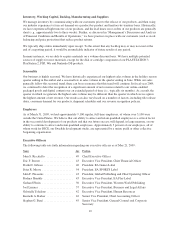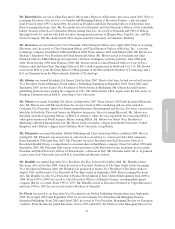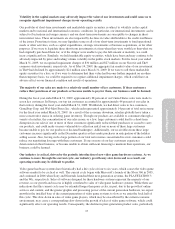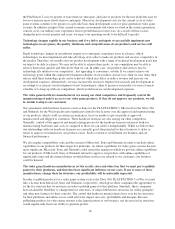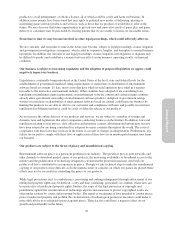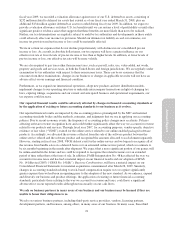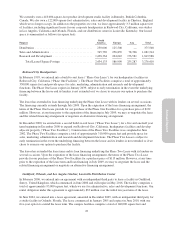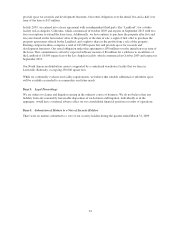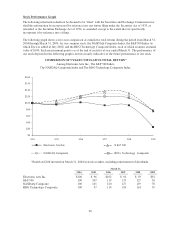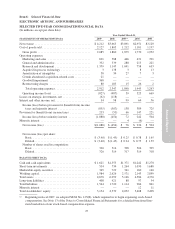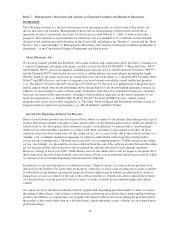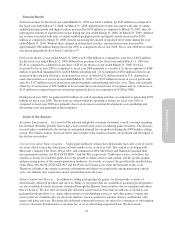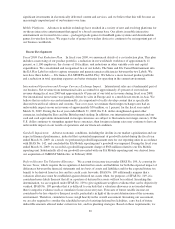Electronic Arts 2009 Annual Report Download - page 100
Download and view the complete annual report
Please find page 100 of the 2009 Electronic Arts annual report below. You can navigate through the pages in the report by either clicking on the pages listed below, or by using the keyword search tool below to find specific information within the annual report.If one or more of our titles were found to contain hidden, objectionable content, our business could suffer.
Throughout the history of our industry, many video games have been designed to include certain hidden content
and gameplay features that are accessible through the use of in-game cheat codes or other technological means
that are intended to enhance the gameplay experience. However, in several recent cases, hidden content or
features have been found to be included in other publishers’ products by an employee who was not authorized to
do so or by an outside developer without the knowledge of the publisher. From time to time, some hidden content
and features have contained profanity, graphic violence and sexually explicit or otherwise objectionable material.
In a few cases, the Entertainment Software Ratings Board (“ESRB”) has reacted to discoveries of hidden content
and features by reviewing the rating that was originally assigned to the product, requiring the publisher to change
the game packaging and/or fining the publisher. Retailers have on occasion reacted to the discovery of such
hidden content by removing these games from their shelves, refusing to sell them, and demanding that their
publishers accept them as product returns. Likewise, consumers have reacted to the revelation of hidden content
by refusing to purchase such games, demanding refunds for games they have already purchased, and refraining
from buying other games published by the company whose game contained the objectionable material.
We have implemented preventative measures designed to reduce the possibility of hidden, objectionable content
from appearing in the video games we publish. Nonetheless, these preventative measures are subject to human
error, circumvention, overriding, and reasonable resource constraints. In addition, to the extent we acquire a
company without similar controls in place, the possibility of hidden, objectionable content appearing in video
games developed by that company but for which we are ultimately responsible could increase. If a video game
we published were found to contain hidden, objectionable content, the ESRB could demand that we recall a game
and change its packaging to reflect a revised rating, retailers could refuse to sell it and demand we accept the
return of any unsold copies or returns from customers, and consumers could refuse to buy it or demand that we
refund their money. This could have a material negative impact on our operating results and financial condition.
In addition, our reputation could be harmed, which could impact sales of other video games we sell. If any of
these consequences were to occur, our business and financial performance could be significantly harmed.
If we ship defective products, our operating results could suffer.
Products such as ours are extremely complex software programs, and are difficult to develop, manufacture and
distribute. We have quality controls in place to detect defects in the software, media and packaging of our
products before they are released. Nonetheless, these quality controls are subject to human error, overriding, and
reasonable resource constraints. Therefore, these quality controls and preventative measures may not be effective
in detecting defects in our products before they have been reproduced and released into the marketplace. In such
an event, we could be required to recall a product, or we may find it necessary to voluntarily recall a product,
and/or scrap defective inventory, which could significantly harm our business and operating results.
Changes in our tax rates or exposure to additional tax liabilities could adversely affect our earnings and
financial condition.
We are subject to income taxes in the United States and in various foreign jurisdictions. Significant judgment is
required in determining our worldwide provision for income taxes, and, in the ordinary course of our business,
there are many transactions and calculations where the ultimate tax determination is uncertain.
We are also required to estimate what our tax obligations will be in the future. Although we believe our tax
estimates are reasonable, the estimation process and applicable laws are inherently uncertain, and our estimates
are not binding on tax authorities. The tax laws’ treatment of software and internet-based transactions is
particularly uncertain and in some cases currently applicable tax laws are ill-suited to address these kinds of
transactions. Apart from an adverse resolution of these uncertainties, our effective tax rate also could be
adversely affected by our profit level, by changes in our business or changes in our structure resulting from the
reorganization of our business and operating structure, changes in the mix of earnings in countries with differing
statutory tax rates, changes in the elections we make, changes in applicable tax laws (in the United States or
foreign jurisdictions), or changes in the valuation allowance for deferred tax assets, as well as other factors. In
20


